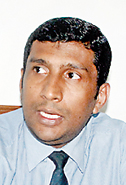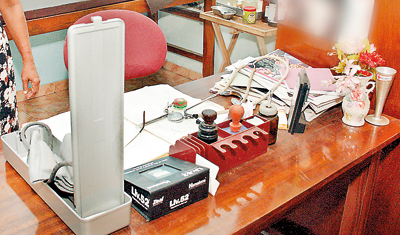News
Quacks a necessary evil outnumber registered GPs
View(s):Time-consuming State hospitals, costly private hospitals drive the poor to these unscrupulous individuals on whom drug companies dump their unregistered drugs
By Nadia Fazlulhaq
Doctors are bound by an oath to treat the sick and save lives, but the increase in the number of phony doctors, better known as quacks, are making more people ill and bringing down the country’s improved Health record.

Dr. Navin de Soyza
From interdicted medical officers to Medical College dropouts, from paramedical officers to attendants, from retired pharmacists to relatives of late doctors, there are about 40,000 quacks operating in the country, despite there being about 30,000 registered doctors in Allopathy (Western), Ayurveda and Homeopathy.
Recently, it was reported from Kimbulapitiya, Negombo, that a bogus doctor was arrested for operating a drug rehabilitation centre and selling banned medicinal drugs to addicts, instead of treating them.
The suspect, Ajith Wipula Bandara (46) was arrested following a sting operation employing a decoy to purchase drugs. The police team also discovered a large quantity of banned drugs. At present the fine for quacks is Rs 2,000, while the Health Ministry has been drafting legislation for about a year, to increase the fine to Rs 5,000 with a five-year imprisonment.
The registration numbers listed on their name-boards vary from those for Justices of the Peace, Pradeshiya Sabha members, deceased doctors, or clinics run by registered medical professionals, where quacks work during the day and professionals during the evening hours.
Colombo University’s Senior lecturer in Sociology and author of ‘Medical Quackery in Sri Lanka’, Dilrukshi Abeysinghe told the Sunday Times that, without a strong demand from patients, such a large number of Non Qualified Western Medical Practitioners (NQWMPs) cannot exist.
“In my study, patients who consulted NQWMPs, cited several reasons for not visiting State hospitals for illnesses they were suffering from, at the time they were interviewed. Among these are delays due to overcrowding, communication difficulties and dissatisfaction with the care given by hospital staff,” she said.

Police raided this medical centre of a bogus doctor (file pic)
As Health services offered at private hospitals are costly and the majority of patients who consulted these doctors pointed out that the fees charged by private practitioners are way too high.
“The patients were reluctant to go into details about their illnesses with medical practitioners in the official Health sector, because of fear of communicating with the doctor because he/she may be too busy or may ask too many questions relating to their illness,” she said.
Against the backdrop of such shortcomings within Western medical establishments, quacks have been successful in winning the loyalty of a social group to function as treatment providers.
“These bogus doctors have taken advantage of the prevailing situation by being sensitive and responsive to desires, needs, feelings and other existential circumstances of patients, in particular, those who are underprivileged and vulnerable,” she said.
Ms. Abeysinghe said, bogus doctors also maintain close relationships with paramedical officers and local politicians.
“These doctors are useful to politicians for reaching out to voters at village level, as they are strategically positioned figures. For quack, paramedical officers are useful to obtain information on health-related matters and to avert legal actions against them.”
Another danger is that these quackss are used by drug companies to distribute their pharmaceuticals widely. With regard to the introduction of new drugs into the market, quacks are strategically more important to drug companies than are legal medical practitioners.
“According to sales representatives, registered medical practitioners do not readily prescribe new drugs introduced into the market, unless they have been registered with the drugs authority, while quacks have no such scruples,” she added.
The Government Medical Officers Association (GMOA), along with the support of private telecom service providers, has initiated a programme to help the public ascertain whether a doctor is a qualified/registered medical practitioner or not.
GMOA spokesman Dr. Navin de Soyza said the programme gives a number to which the public can send an SMS with the doctor’s name, and will receive a reply stating whether the doctor is registered or not.
He added that the GMOA will also request the Ayurveda and Homeopathy Medical Councils to join this programme, though the date of commencement has not been decided.

“There have been child deaths, administration of wrong drugs, and even amputations by these quacks. But if/when the situation gets worse, the patient is brought to a State hospital, and sometimes it’s too late,” he said.
He said, in some areas, quacks are famous for effective medicines that cure illnesses like flu, especially in children. Unfortunately, they are being given strong antibiotics.
“Once given a regular dose of strong antibiotics, the body becomes immune to strong antibiotics when the child grows up.” he said.
Despite police having powers to arrest such criminals, they are helpless without the support of all the councils, said Police spokesman Prishantha Jayakody.
“At the beginning of the year, a discussion was held between the Inspector General of Police and the GMOA. We were told that the other councils will also submit names. Unfortunately, we didn’t get the names of the registered medical officers in the Ayurveda and Homeopathy councils,” he said.
He said that once the names are received, police will get the support of the Investigation and Flying Squad of the Health Ministry.
Registrar of the Sri Lanka Medical Council (SLMC) Dr. N.J. Nonis said that the SLMC has registers and the names of doctors are available on its website. “If the police questions, we will issue a statement, which is considered admissible evidence in Courts,” he said.
Ayurveda Council Registrar Basil Ranjith Fernando refused to give details of the number of qualified and quacks in the field, with no response to a written request for information.
Homeopathy Council Registrar A. Perera said that the list of names of permanent homeopathy practitioners and temporary practitioners will be submitted to police next week.
“There are 111 permanent practitioners and 209 temporary practitioners, who will get the permanent position after five years of training. The names will be published in the gazette as well as submitted to police,” he added.
Follow @timesonlinelk
comments powered by Disqus















